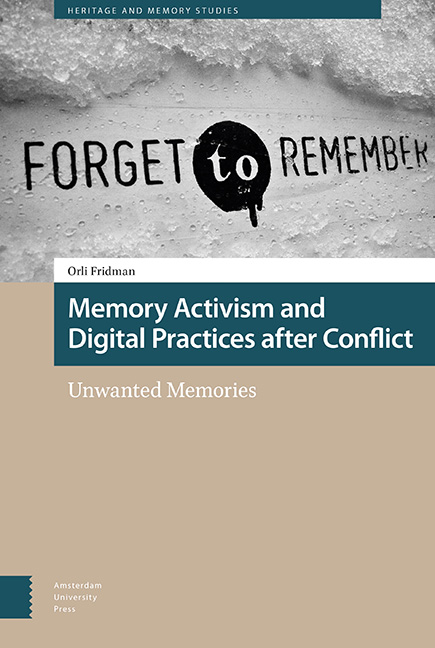Book contents
- Frontmatter
- Table of Contents
- List of Figures
- Preface
- Acknowledgements
- Introduction: Memory Activism and Alternative Commemorative Practices after Conflict
- 1 Unwanted Memories of (the Wars of) the 1990s
- 2 ‘Not in My Name’: From Anti-War to Memory Activism: The First Generation
- 3 ‘Too Young to Remember, Determined Never to Forget’: The Second Generation
- 4 Hashtag Memory Activism: Digital Memory Practices and Online Commemorations
- 5 Regions of Memory: The Post-Yugoslav Space as a Region of Memory Activism
- Epilogue: Unwanted Pasts in an Unresolved Present
- Appendices
- Bibliography
- Index
Epilogue: Unwanted Pasts in an Unresolved Present
Published online by Cambridge University Press: 07 October 2022
- Frontmatter
- Table of Contents
- List of Figures
- Preface
- Acknowledgements
- Introduction: Memory Activism and Alternative Commemorative Practices after Conflict
- 1 Unwanted Memories of (the Wars of) the 1990s
- 2 ‘Not in My Name’: From Anti-War to Memory Activism: The First Generation
- 3 ‘Too Young to Remember, Determined Never to Forget’: The Second Generation
- 4 Hashtag Memory Activism: Digital Memory Practices and Online Commemorations
- 5 Regions of Memory: The Post-Yugoslav Space as a Region of Memory Activism
- Epilogue: Unwanted Pasts in an Unresolved Present
- Appendices
- Bibliography
- Index
Summary
This study has traced the emergence of memory activism in the aftermath of conflict and war. In its various forms, in the streets or on digital platforms, memory activism has been explored here as a framework for analysing the actions and claims of various actors, from below. My analysis first positioned memory activism as a strand of civic activism against denial and silence, which I consider to be at the heart of peace activism. The practices of memory activists in Serbia, as they disseminate alternative knowledge through acts of alternative commemoration, onsite and online, offer a case study. Within the context of memory politics in Serbia, the labour of these activists with unwanted memories of the wars of the 1990s exemplifies the ways local actors can claim agency in public memoryscapes, through their mnemonic actions. Memory activists in Serbia undertake these actions in the face of official denial, tainted with the rhetoric of victimization. But they are determined not to accept official narratives or leave unwanted memories in the past, and are thus enabled to confront a lack of knowledge, as well as apathy, fatigue, and the desire to simply move on, through alternative commemorations.
A generational lens was an important frame for this analysis, and it was the first generation of memory activists in Serbia that insisted on creating space for anti-nationalist, and later, de-ethnicized interpretations of the recent past, by forming an alternative commemorative calendar. I maintain that when commemorative actions bring the memory of victims of war crimes into Belgrade, protesters are taking a stance against not only denial of the past, but also the current social malfunction in Serbia that distinguishes memories and relativizes pain according to ethno-national belonging. Viewing these actions through the generational lens allowed me to observe the continuity and change in the praxis of activists, including the transition of the first generation from anti-war activism to memory activism, and evolutions in the mnemonic claims introduced by the second generation.
It is among this second generation of memory activists that a turn towards memory of activism has begun to emerge in recent years.
- Type
- Chapter
- Information
- Memory Activism and Digital Practices after ConflictUnwanted Memories, pp. 197 - 202Publisher: Amsterdam University PressPrint publication year: 2022



